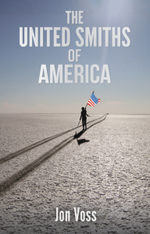 The United Smiths of America
The United Smiths of America
by Jon VossePub, 371 pg.
2018
Read: December 12 – 14, 2018

This is going to be rough, but I promised to write this, so here goes . . .
Ten citizens of the U. S. wake up in a shipping container. They’re wearing something akin to prison jumpsuits, and a collar. They have no idea where they are, they have no idea how they got there, or who anyone with them is. They are told that they have 10 hours to defeat 9 other teams, made up of people from 9 other regions (some single-nation, others geographic groups) to win $1 billion. There are a couple of vehicles provided for them, and a lot of weapons (that they have to figure out how to use). Oh, and those collars are equipped with C-4 in order to assure they’ll comply.
Hunger Games meets the Amazing Race (or something). The Americans are all named Smith — a sign that they’re random nobodies — and each team is full of equivalents — Garcias, Suzukis, Ivanovs, etc. (these are not necessarily the names, I refuse to open the book again to check and see). Each chapter covers ten minutes or so of the ten hours they have to fight or die.
I did not enjoy a single moment of this experience. When I wasn’t bored, I was offended. When I wasn’t offended, I was discouraged by the writing. I walked away from each session disappointed and dreading returning to it. I’m not saying it ruined my life for a couple of days, but it sure made things unpleasant.
The “humor” (I think there were bits that were supposed to be humorous) was juvenile, puerile, and not funny. To say that the characters from various nations were walking stereotypes would be generous, more than one were also racist — oh, and someone (a fairly educated character) described (presumably white) Australians as a “race.” Which was news to me. One, I stress one of the Smiths came close to being more than two-dimensional and worth reading about — no other characters (no matter their nationality) came close. The story as a whole makes 80’s action films like Iron Eagle look subtle and nuanced. The author uses italics and all-caps to show emotion in dialogue, which should have been the first sign that I need to bail on the book.
The sex scene gives new meaning to gratuitous. I mean . . . ugh.
The fight scenes — and there were many, just not as many as you might expect — were decent, though.
I pushed on to the end because 1. I’d told the publicist I’d read this piece of garbage; 2. I was curious about the point of it all (and yes, you have to get near the end to find it); and 3. I wanted to see if there was anything redeeming to be found in the book. The results were, not surprisingly, disheartening. 1. I can’t imagine that group will want to work with me again; 2. The point is . . . maddening, convoluted, and uninspired; and 3. Nope.
Don’t. Just don’t. If any of you have a time machine and would like to use it to stop me, leave a note in the comments and I’ll give you a time, date and address.
Disclaimer: I received a copy of this novel in exchange for this post from a publicist who will probably not appreciate this post at all. Sorry about that.
—–

 |
✔ Read a book that takes place in one day. |

